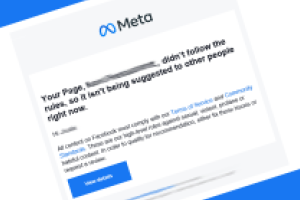Familiar with the “false information” labels that pop up underneath Facebook and Instagram posts? If you’ve seen them, you’ve likely noticed that third-party fact-checkers have been the ones determining whether misleading information is being spread. But in the coming months, Meta will officially pull the plug on its third-party fact-checking program. Instead, it’s replacing it with a new system called Community Notes. In this blog, we’ll go over what will be changing and how it will affect business marketing.
What to Know About 3rd Party Fact-Checking and Community Notes
For the past few years, Meta has relied on third-party fact-checkers to help identify and label false or misleading content across its platforms. These independent organizations worked to verify the accuracy of posts, articles, and videos circulating on Facebook and Instagram, with the goal of limiting the spread of misinformation.
With a switch to a community-driven moderation system, Community Notes will allow users to comment on the accuracy of information. With a goal to allow users to actively participate in fact-checking, the new system will give participants the ability to flag and add context to posts that may be misleading. Similar to X’s Community Notes, Meta’s version seeks to use crowd-sourced input to identify and address potentially inaccurate content. While this shift may lead to more diverse insights and faster updates, it also comes with challenges, including the potential for misuse or disagreement over what is considered misleading.
How Does 3rd Party Fact-Checking Affect Business’s Marketing?
With many businesses utilizing Meta to build brand awareness, drive sales, and engage with customers, third-party fact-checking played a pivotal role in maintaining the integrity and trustworthiness of content shared on platforms. Here’s how it will directly impact business marketing:
- Brand Integrity and Customer Trust: With users contributing to Community Notes, brands will have to be more cautious about the claims they make in their marketing efforts. If content gets flagged as misleading or false by Community Notes, it can severely affect its reputation and consumer trust. Be sure to stay on top of all flagged content and resolve the issue with Meta quickly.
- Impact on Organic Reach and Engagement: Meta prioritizes reliable, accurate content. Pages that focus on well-researched content could see better organic reach. By encouraging user participation, Community Notes can also make content more dynamic and interactive, fostering greater engagement within the platform
- Crisis Management: If content is inaccurate or marked is untrustworthy, it is important to address the content immediately. If misinformation continues to spread, your business could lose consumer trust or face public backlash.
- Paid Media and Advertising: Paid ads may face more scrutiny as fact-checking becomes more rigorous. If an ad contains misleading or unverifiable information, it could be flagged, leading to reduced reach, delays in approval, or the removal of the ad.
Overall, as Meta plans to roll out a similar feature, businesses should prepare for both the opportunities and challenges it presents. It could become a useful tool for engaging with customers and managing public relations directly, but it will require careful monitoring and potentially quick responses to mitigate any misuse or negative impacts. To learn more about how 3rd Party Fact-Checking will impact your business, visit Meta here.
About the enVisioning Success Podcast
This article is based on topics discussed in enVisioning Success, our weekly podcast hosted by Vision Advertising CEO Laura DiBenedetto and COO Julia Becker Collins. In it, they discuss all things business and marketing, from lead generation to leadership. Find us on PodBean to download from your platform of choice, or subscribe to our mailing list to get new episodes and other news delivered directly to your inbox. Interested in working with Vision Advertising? Learn more about our services and contact us today.




